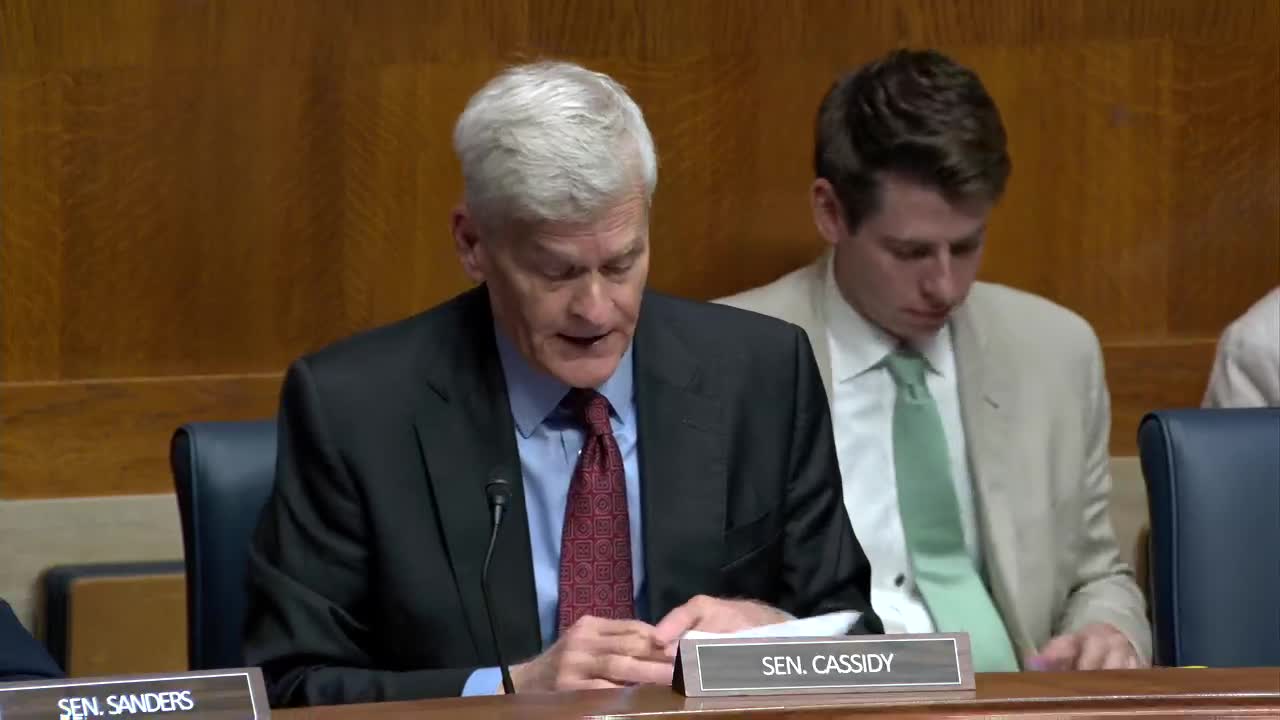Senate Committee Highlights Employee Ownership and Health Legislation Support
July 30, 2025 | Health, Education, Labor, and Pensions: Senate Committee, Standing Committees - House & Senate, Congressional Hearings Compilation
This article was created by AI summarizing key points discussed. AI makes mistakes, so for full details and context, please refer to the video of the full meeting. Please report any errors so we can fix them. Report an error »

In a recent meeting of the U.S. Senate Committee on Health, Education, Labor, and Pensions, several significant legislative initiatives were discussed, highlighting the committee's commitment to enhancing worker benefits and improving public health services.
One of the key topics was the ongoing efforts to strengthen employee ownership, which committee members from both parties expressed support for. Although the specific legislation was not on the agenda for this meeting, there is a clear intention to refine the policy to ensure it can be presented for markup in the future. This initiative aims to increase financial benefits for workers, reflecting a growing recognition of the importance of employee ownership in the economy.
Additionally, the committee is working on reauthorizing the Over-the-Counter Monograph Drug User Fee Amendments (MUFA). This legislation is designed to expedite the Food and Drug Administration's review process for over-the-counter drugs, ensuring they become available to consumers more quickly while maintaining safety standards. Senators Banks and Kang have been particularly active in this area, with support from other committee members to enhance the review process for sunscreen and expand the availability of various medications.
The meeting also addressed the Uniform Services Leave Parity Act, which aims to provide public health service commissioned core officers with the same leave benefits as other uniformed service members. This change is expected to enhance equity among service members and improve morale.
Another significant piece of legislation discussed was the Improving Care in Rural America Reauthorization Act. This act focuses on addressing healthcare needs in rural communities by reauthorizing three grant programs that support preventive screenings, telehealth services, and chronic disease management. These initiatives are crucial for improving health outcomes in underserved areas.
Lastly, the Kaye Hagen Tick Reauthorization Act was highlighted, which aims to bolster programs that prepare for and respond to tick-borne and other vector-borne diseases. Named in honor of former Senator Kaye Hagen, who succumbed to a rare tick-borne disease, this legislation seeks to enhance coordination among federal agencies and health departments to effectively manage disease outbreaks.
In conclusion, the committee's discussions reflect a proactive approach to addressing critical issues affecting workers and public health. As these bills progress, they are expected to play a vital role in promoting worker rights, improving healthcare access, and enhancing public health responses across the nation. The committee's commitment to a pro-worker, pro-family, and pro-patient agenda is evident, and stakeholders will be watching closely as these initiatives move forward.
One of the key topics was the ongoing efforts to strengthen employee ownership, which committee members from both parties expressed support for. Although the specific legislation was not on the agenda for this meeting, there is a clear intention to refine the policy to ensure it can be presented for markup in the future. This initiative aims to increase financial benefits for workers, reflecting a growing recognition of the importance of employee ownership in the economy.
Additionally, the committee is working on reauthorizing the Over-the-Counter Monograph Drug User Fee Amendments (MUFA). This legislation is designed to expedite the Food and Drug Administration's review process for over-the-counter drugs, ensuring they become available to consumers more quickly while maintaining safety standards. Senators Banks and Kang have been particularly active in this area, with support from other committee members to enhance the review process for sunscreen and expand the availability of various medications.
The meeting also addressed the Uniform Services Leave Parity Act, which aims to provide public health service commissioned core officers with the same leave benefits as other uniformed service members. This change is expected to enhance equity among service members and improve morale.
Another significant piece of legislation discussed was the Improving Care in Rural America Reauthorization Act. This act focuses on addressing healthcare needs in rural communities by reauthorizing three grant programs that support preventive screenings, telehealth services, and chronic disease management. These initiatives are crucial for improving health outcomes in underserved areas.
Lastly, the Kaye Hagen Tick Reauthorization Act was highlighted, which aims to bolster programs that prepare for and respond to tick-borne and other vector-borne diseases. Named in honor of former Senator Kaye Hagen, who succumbed to a rare tick-borne disease, this legislation seeks to enhance coordination among federal agencies and health departments to effectively manage disease outbreaks.
In conclusion, the committee's discussions reflect a proactive approach to addressing critical issues affecting workers and public health. As these bills progress, they are expected to play a vital role in promoting worker rights, improving healthcare access, and enhancing public health responses across the nation. The committee's commitment to a pro-worker, pro-family, and pro-patient agenda is evident, and stakeholders will be watching closely as these initiatives move forward.
View full meeting
This article is based on a recent meeting—watch the full video and explore the complete transcript for deeper insights into the discussion.
View full meeting